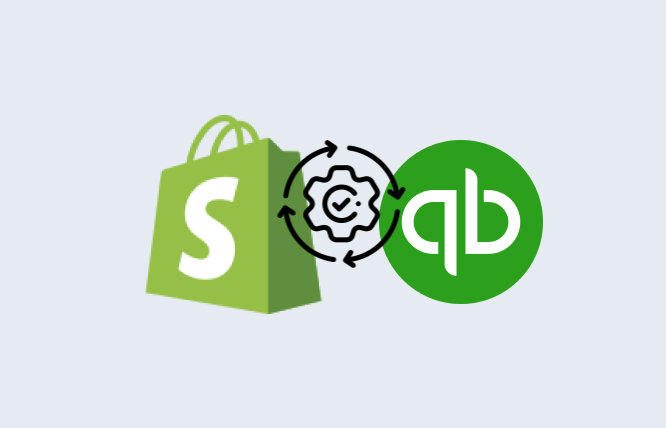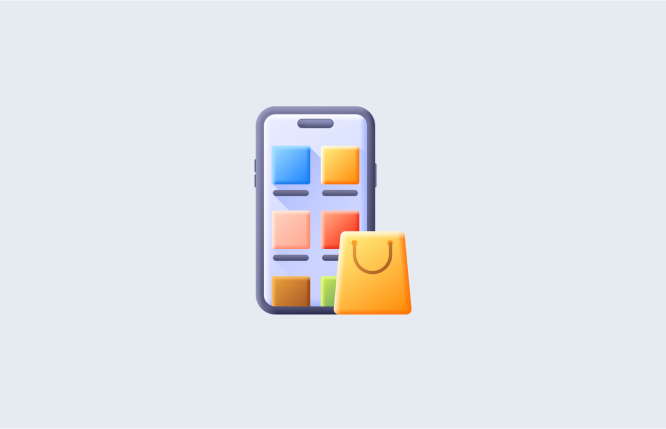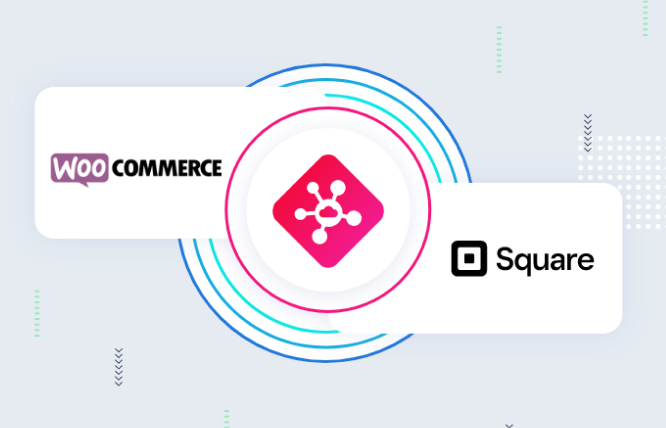Introduction
This blog post is about integrating Shopify, an e-commerce platform, with QuickBooks, a financial management software. The integration automates data transfer between the two platforms, saving time and reducing errors. It benefits e-commerce business managers by simplifying finances and providing valuable insights for better decision-making.
Having a successful E-commerce business includes handling many tasks all at once. Many people find themselves swamped by duty when it comes to doing things like stocking goods, keeping records about customers, or checking their money status in order to make sure they have enough cash.
Anytime this happens, it means that there should be a good linkage between Shopify which serves as an e-commerce platform for your store online, and QuickBooks which is a financial technology platform that you can use to manage your finances online.
The best Shopify QuickBooks Integration will simplify your financial procedures, conserve precious time, and provide you with vital knowledge for more intelligent business choices.
What is QuickBooks?
QuickBooks is a detailed accounting software that offers features for:
- Managing finances (payments, invoices, expenses)
- Tracking inventory
- Payroll processing
- Tax filing
- Bank reconciliation
QuickBooks is a finance management hero! It lets you track income & expenses, manage inventory, send invoices, and generate reports – all in one place. Trusted by millions, QuickBooks helps you take control of your business’s (E-commerce) money with ease.
Why Integrate Shopify with QuickBooks?
Handling your finances manually across multiple platforms is a thing of the past, as it can be time-consuming and prone to errors. Linking Shopify and QuickBooks eliminates the need for manual data entry by automating data transfer.
Here’s how this powerful combination benefits your e-commerce business:
- Save Time: E-commerce businesses can benefit from this powerful combo in the following ways: time saver to stop wasting hours of inputting data and cross-referencing tables: the integration synchronises data on sales, stock, client information, and other details into Shopify and QuickBooks.
- Improved Accuracy: As a human, you can misprint or miss a digit, resulting in an error. As such, automation ensures your data is valid and current as soon as it is uploaded to both platforms.
- Simplified Tax Filing: Filing taxes is incredibly simple when all of your financial information is in a single place. QuickBooks can help you organise your income and expenses, construct tax files, and simplify the process of filing your taxes.
- Enhanced Decision Making: You can obtain useful insights into how your business is performing through detailed reports created by QuickBooks. Examine sales patterns and use data-driven insights to enhance your e-commerce approach.
- Better Inventory Management: Shopify QuickBooks integration offers real-time synchronisation of your inventory levels. This removes the possibility of selling more than what is available and guarantees that you have sufficient inventory to fulfil customer needs.
Downsides of Shopify QuickBooks Integration
While the best Shopify QuickBooks integration offers a wealth of benefits, it’s important to consider some potential drawbacks before taking the plunge:
- Potential for Errors: Even with the automation of data transfer, mistakes in your starting data configuration can result in long-term problems in your financial records. Make sure to review your data mapping thoroughly while setting up and keep an eye on the integration for any discrepancies.
- Learning Curve: Although the setup is usually simple, there is still a learning process in grasping the integration functionality and handling data mapping. If basic accounting principles make you uneasy, you should think about getting assistance from a Shopify development service-providing company and integrate helpful accounting tools.
- Integration Costs: Monthly subscription fees are typically associated with third-party integration services. Although these fees can be balanced out by the time saved and increased accuracy, they represent an extra expense to consider.
Despite these potential downsides, a Shopify QuickBooks integration is the best tool for most e-commerce businesses. By carefully considering your needs consulting with a Shopify development agency will be helpful for your business’s long-term growth.
How to Set Up Shopify QuickBooks Integration
The process of setting up a Shopify QuickBooks integration is straightforward, and there are two main options:
- Shopify’s built-in integration app
- Third-party integration service.
Here’s a quick guide to set up Shopify and QuickBooks:
Using Shopify’s Built-in Integration App
Step 1: Accessing the App
- Log in to your Shopify admin panel.
- Navigate to Apps > Shopify App Store.
- Search for “QuickBooks Online” and install the official app by Shopify.
Step 2: Connecting Accounts
- Launch the app from your Shopify dashboard.
- Click on “Connect” and go through the on-screen prompts to authorise the connection between Shopify and QuickBooks Online. This might involve entering login credentials or authorisation tokens.
Step 3: Data Mapping
- Define how data will flow between platforms. You can customise how sales data (orders, refunds), inventory items, and customer information should be matched and categorised in QuickBooks.
Step 4: Testing and Verification
- Run a few test transactions in Shopify.
- Verify that the data is syncing correctly on both platforms (Shopify and QuickBooks).
Using a Third-Party Integration Service
Step 1: Choosing a Service
- Research and select a reputable third-party integration service that caters to your specific needs. Popular options include:
- Xero
- A2X Accounting
- Pabbly Connect
Step 2: Account Connection and Setup
- Adhere to the particular directions given by the service you have selected. This usually includes making a new account with the platform and linking your Shopify and QuickBooks Online accounts.
How Much Does a Shopify QuickBooks Integration Cost?
The cost of a Shopify QuickBooks integration depends on the method you choose:
Shopify’s built-in integration app is 100% free. This is the most cost-effective solution for smaller businesses with straightforward accounting requirements. However, most third-party integration platforms demand a monthly subscription fee. Those fees vary depending on the supplier of the service and the nature of their service offering.
The cost can vary depending on the level of complexity. The more extensive the integration or complexity, the higher the cost will be.
Here’s a quick breakdown:
- Simple and Free: Shopify’s built-in app (good for basic needs)
- More Features, More Cost: Third-party integrations (flexible but costlier)
Remember, even with potential subscription fees for third-party services, the time saved and improved accuracy from the integration can often outweigh the cost.
Beyond Shopify QuickBooks Integration: Streamlining Your E-commerce Accounting
Although a ShopifyQuickBooks integration is effective, it is only a single component of the entire e-commerce ecosystem. Let’s look at how we can go further than just integrating Shopify with QuickBooks. Here are some extra services to think about:
Search for full business management solutions that connect with your accounting software and provide functionalities such as:
- Management of inventory
- Managing customer relationships (CRM)
- Management of projects.
Developing a custom mobile app can improve your e-commerce activities with functions such as mobile order processing, real-time sales monitoring, and in-app customer assistance. This information can be easily incorporated into your accounting software to achieve a comprehensive financial overview.
Enterprise Technology Solutions cater to big corporations with intricate accounting needs, providing advanced features such as:
- Advanced Financial Reporting
- Business Intelligence (BI)
- Scalability
Technology solution services can uplift your business requirements and suggest the most suitable accounting software and integration solutions. They are also available to assist with implementation, training, and providing ongoing support.
Detailed Web development services for smoother e-commerce operations can also be of high value since you anticipate a full-functional E-commerce that handles all the tasks.
If you are using WooCommerce for your e-commerce site, a WooCommerce web developer can assist in customising your store to improve accounting processes. They have the ability to incorporate more accounting tools, automate tasks, and guarantee smooth data flow between your store and accounting software.
Moreover, skilled web and app developers have the ability to develop personalised solutions for particular accounting requirements. This might include connections with more business tools, visualisation dashboards for data, or automated reporting features.
Conclusion
If you are looking for ways to streamline your sales operation and grow the sales by focusing on business operation, then Shopfiy QuickBooks integration is for you. The combo will give you time to focus solely on growth opportunities rather than consuming your energy on complex financial tasks. So with further delay, consult with Shopify experts and get comprehensive integration services for your Shopify store.
Also Read:Hire Someone to build Shopify Store
Frequently Asked Questions
A Shopify QuickBooks integration is a tool that syncs data between your Shopify store and QuickBooks accounting software automatically. This removes the necessity of entering data manually, saving time and decreasing mistakes.
There are many benefits to using a Shopify QuickBooks integration, including:* Saves time by automating data transfer* Improves precision by eradicating manual data entry errors* Simplifies tax filing by consolidating financial data* Provides valuable insights for better decision-making* Ensures real-time inventory synchronisation
An integration between Shopify and QuickBooks can be a hack for many online businesses that are looking to streamline financial operations. Nonetheless, for businesses with intricate operations and unique accounting requirements, they may require a specialised solution provided by a third-party integration service.
A Shopify QuickBooks inventory integration synchronises inventory data between your Shopify store and QuickBooks accounting software. This removes the necessity for manual updates, decreasing mistakes and conserving your valuable time.
Once set up, the integration will automatically:Sync inventory levels: Whenever a purchase is made on your Shopify store, the system will update and reduce the corresponding item in your QuickBooks inventory.Reduce the risk of stockouts: It will give you an alert to avoid situations where you run out of stock and disappoint customers.Simplify purchase order creation: Making purchase orders is easier with correct inventory information, allowing you to quickly create orders in QuickBooks to restock inventory as necessary.
Have questions or feedback?
Get in touch with us and we‘l get back to you and help as soon as we can!




